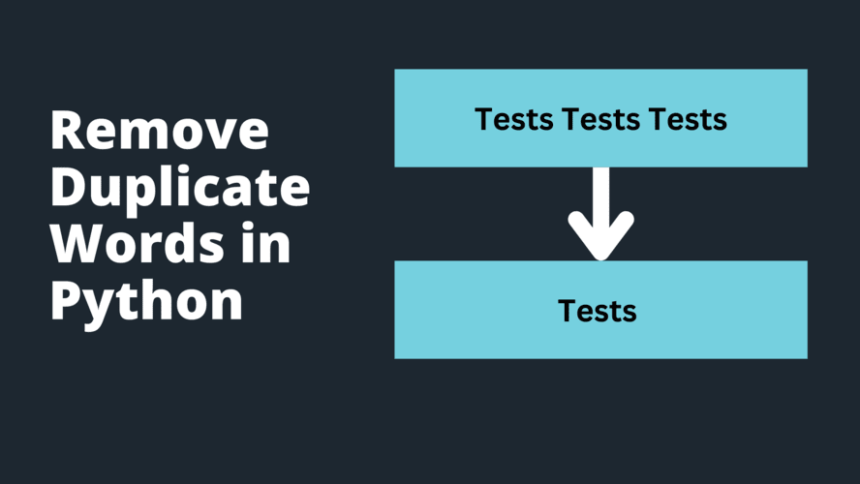Intro – Remove Duplicate Words
Whether you are summarizing articles, optimizing web content, or performing natural language processing (NLP) tasks, eliminating duplicate words can significantly improve the quality and impact of your written material. In this article, we explore the importance of removing duplicate words in Python and provide real-world examples of its application.
Why Remove Duplicate Words?
1. Enhanced Readability:
Duplicate words can make text less readable and more verbose. By removing duplicates, you can create more concise and engaging content. This is particularly useful in articles, blog posts, and any form of written communication where clarity is paramount.
2. Improved SEO:
In the world of digital marketing, Search Engine Optimization (SEO) is crucial for driving traffic to websites. Removing duplicate words from web content can enhance keyword diversity and improve a page’s ranking on search engine results pages. This, in turn, can attract more visitors to your website.
3. Efficient NLP Processing:
In NLP tasks, such as sentiment analysis or topic modeling, eliminating duplicate words can reduce the dimensionality of the data. This simplification not only enhances the efficiency of NLP algorithms but also improves their accuracy and performance.
Removing Duplicate Words – Python Code
def remove_duplicate_words(paragraph):
# Split the paragraph into words
words = paragraph.split()
# Create a new list to store unique words in order of appearance
unique_words = []
# Iterate through the words in the paragraph
for word in words:
# If the word is not already in the unique_words list, add it
if word not in unique_words:
unique_words.append(word)
# Reassemble the unique words into a paragraph
unique_paragraph = ' '.join(unique_words)
return unique_paragraph
# Real-world example usage:
original_paragraph = "Python is a versatile programming language. Python is used in web development, data analysis, and machine learning."
new_paragraph = remove_duplicate_words(original_paragraph)
print("Original Paragraph:")
print(original_paragraph)
print("\nParagraph with Duplicate Words Removed:")
print(new_paragraph)
💁 Check out our other articles😃
👉 Generate a free Developer Portfolio website with AI prompts
👉 Fix Spelling Mistakes in Python Like a Pro!
Real-World Use Cases
Let’s delve into some real-world examples to illustrate the significance of removing duplicate words:
Text Summarization: When generating a summary of a long article or document, removing duplicate words can make the summary more concise and readable.
original_text = "In recent years, artificial intelligence has made significant advancements. Artificial intelligence, or AI, is now being used in various industries. AI has applications in healthcare, finance, and transportation."
summarized_text = remove_duplicate_words(original_text)
Summarized Text: “In recent years, artificial intelligence has made significant advancements. AI is now being used in various industries, including healthcare, finance, and transportation.”
Search Engine Optimization (SEO): When optimizing web content for search engines, eliminating duplicate words can improve keyword diversity and overall content quality.
webpage_content = "Our hotel in New York City offers the best New York City experience. If you're visiting New York City, book your stay at our New York City hotel."
optimized_content = remove_duplicate_words(webpage_content)
Optimized Content: “Our hotel in New York City offers the best experience. If you’re visiting, book your stay at our hotel.”
Data Cleaning in Natural Language Processing (NLP): In NLP tasks like sentiment analysis or topic modeling, removing duplicate words can reduce the dimensionality of the data and improve model performance.
customer_reviews = "The product is good. I think the product is good, but it could be better. Overall, the product is satisfactory."
cleaned_reviews = remove_duplicate_words(customer_reviews)
Cleaned Reviews: “The product is good. I think, but it could be better. Overall, satisfactory.”
Social Media Posts: When analyzing or summarizing social media posts, removing duplicate words can help in creating concise and meaningful representations of the content.
tweet = "Just had a great coffee at the local café! The coffee at the café is amazing, highly recommend."
cleaned_tweet = remove_duplicate_words(tweet)
Cleaned Tweet: “Just had a great coffee at the local café! The is amazing, highly recommend.”
These use cases demonstrate how removing duplicate words from a paragraph can enhance readability, improve search engine rankings, and assist in various natural language processing tasks.
Conclusion
In conclusion, removing duplicate words from text is a simple yet effective practice that can enhance the quality of written content, improve SEO rankings, and boost the efficiency of NLP tasks. Whether you’re a content creator, digital marketer, or NLP practitioner, incorporating this technique into your workflow can lead to more impactful and engaging communication.
So, the next time you’re polishing your writing or optimizing web content, remember the power of removing duplicate words—it’s a small step that can make a big difference.









